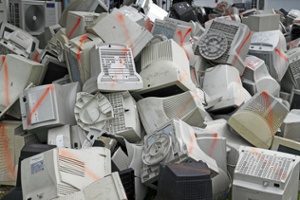 Cases of irresponsible and outright illegal practices by IT recyclers are appearing with greater frequency in the news as of late. Mountains of equipment leaching toxic chemicals into the environment have been discovered at facilities in the U.S. as well as overseas. Governments and human rights organizations are concerned about the conditions for workers at e-waste processing facilities in Asia and Africa. Here in the U.S., companies are trying their best to keep their names out of the news and to avoid paying the fines and legal fees associated with non-compliance with environmental regulations.
Cases of irresponsible and outright illegal practices by IT recyclers are appearing with greater frequency in the news as of late. Mountains of equipment leaching toxic chemicals into the environment have been discovered at facilities in the U.S. as well as overseas. Governments and human rights organizations are concerned about the conditions for workers at e-waste processing facilities in Asia and Africa. Here in the U.S., companies are trying their best to keep their names out of the news and to avoid paying the fines and legal fees associated with non-compliance with environmental regulations.
Most companies partner with an IT asset disposition (ITAD), IT recycling, or remarketing vendor to dispose of their retired equipment. While most vendors will assure their clients that their practices are compliant, safe, and environmentally responsible, what assurance do you really have? If your company’s IT recycling vendor has given you a “certificate of recycling” and nothing else, that doesn’t say much. The following four questions will help you understand more about your vendors’ environmental and workplace safety practices and, if answered satisfactorily, will go a long way toward reducing the risk of non-compliance for your company.
1. Can we tour your facility?
If the vendor refuses to allow you to tour its facilities, it might indicate it has something to hide. It could be it doesn’t have domestic facilities and exports equipment to foreign countries where environmental controls are less strict and working conditions are poor, or outsources recycling to processors who may not be meeting legal and industry standards. If the vendor ascents to a tour, that tells you it not only has U.S.-based facilities, but that it stands behind its standards and operations.
2. What facilities and companies handle the material downstream?
Often, the IT recycling vendor is only the first step in the disposition process. From there it will send the material to its own partners to be recycled, remarketed, or otherwise processed. If your ITAD provider can’t or won’t tell you where it sends material downstream, you should be concerned. It could mean its partners do not follow compliant recycling practices, or your vendor doesn’t know if they do. Either way, even though the material is two or more steps removed from your company, your company still shoulders the burden of liability.
3. What do you mean by ‘free?’
Although once broken down, much of the material in e-waste has value as scrap, not all of it does. And transporting and processing the material in a safe and legal manner will have a cost. That cost cannot always be covered by the value of the material on the scrap market. Maintaining a compliant operation is more costly than an illegal and unsafe one. If a vendor offers you totally free services, be sure you know how it makes money. When a vendor can afford to process all of your e-waste for free, it should be a warning to you that they may not be doing it properly.
4. Which (if any) electronics recycling certifications do you have?
This might be the single most important question regarding environmental practices you could ask your ITAD vendor. If your vendor has been certified by a leading third-party organization like e-Stewards or R2/RIOS (or both), the other three questions have been answered for you. When a vendor holds either of these certifications, it tells you the vendor has invested significant money and time to ensure the standards are being met on an ongoing basis. Compliance with all environmental, worker health and safety, and export laws is required to maintain these certifications. The certification also tells you they have audited their downstream partners to ensure they’re meeting the standards, as well.
Our free white paper, “The 2013 Guide to Environmental Compliance in IT Asset Disposition,” discusses in-depth the benefits of partnering with an e-Stewards or R2/RIOS certified electronics recycling vendor and the risks of not doing so.


